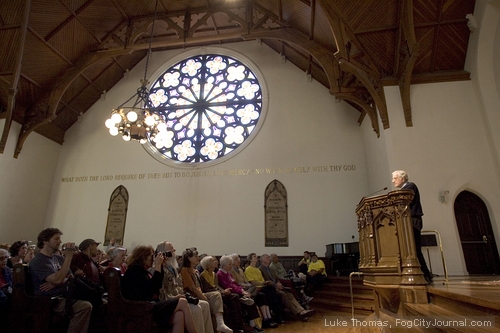
Professor Noam Chomsky discussed US foreign policy
with a packed audience Sunday at the Unitarian Universalist church in San Francisco.
Photos by Luke Thomas
October 8, 2009
Professor Noam Chomsky spoke Sunday at the Unitarian Universalist church about US foreign policy and its failure to change under the Obama administration.
“The policies remain the same though they adapt to different circumstances,” he said.
Chomsky, Institute Professor of Linguistics at MIT, has been a political activist and agitator for over half a century. His opposition to the Vietnam War was what first set him apart as a dissident of US foreign and domestic policy, and to this day, he still speaks out against it.
In spite of the many evils committed under the two Bush regimes, Chomsky warned that it was the Clinton Doctrine, claiming the US has the right to use extreme force to preserve its global interests, was the most sinister.
According to Chomsky, the US has had plans for its domination of world politics and resources for many decades, that the current oil wars in Iraq and Afghanistan are merely the forceful extension of these policies.
The Grand Area
He spoke about the “Grand Area,” a region where the US had originally planned to exercise unprecedented power after World War II, filling the void left by the crumbling British Empire. This region encompassed the Western hemisphere, the Far East, the former British Empire and the Middle East. Foreseeing that Germany would emerge from WWII strongly, Franklin D. Roosevelt and his policy makers assumed Eurasia would be controlled by Germany. However, by 1943, it became clear that Germany wasn’t going to survive the war. Instead, Russia emerged as the greatest threat to US hegemony. Africa, it was deemed, should be given “to the Europeans to exploit in order to recover from World War II.”
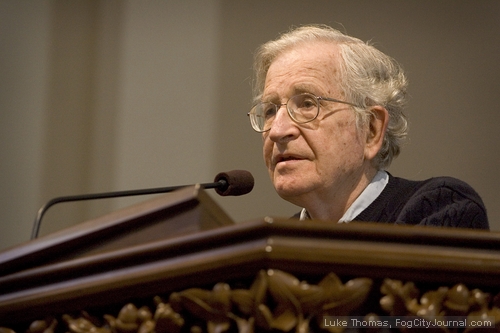
Professor Noam Chomsky
There were secret discussions between the US and the UK over who would control Saudi Arabia after the war. Saudi Arabia was considered “the jewel in the crown” because of its vast oil reserves, a prized asset for any empire. Roosevelt, in turn, declared Saudi Arabia ‘democratic’ to persuade Congress to gift the Saudis funding to effectively buy its patronage. This policy remains in place today, with the weak ruling House of Saud dependent on US military weaponry to stave off insurrections from a suppressed population.
Add to this that the proposed Trans-Afghanistan Pipeline is intended as much to secure the region’s gas reserves for the US as it is to keep Russia, India, Iran and China from controlling it. Despite US attempts to apply for “observer status” in the alliance between Central Asian States such as China, Russia and Iran, it has been categorically turned down several times.
General James Jones, National Security Advisor and former member of the Board of Directors at Chevron, the world’s fifth-largest company, is quoted as saying there is a “conflict inside the administration” about whether to continue and escalate the war in Afghanistan, also known as The Energy Corridor, emphasizing its geographical proximity and significance. Antonia Juhasz, author and director of The Chevron Program at Global Exchange, urged the audience and anyone else to lobby the government on all levels to bring an end to the conflict.
Speaking after Chomsky, Juhasz stated that this was the first time that the majority of American people were against the war in Afghanistan, that Wednesday marked the first day of the ninth year since the US invasion Afghanistan. Furthermore, 80% of Pakistanis are opposed to US assistance in their fight against terrorism, a 20% increase since March.
“We are making more enemies,” she said.
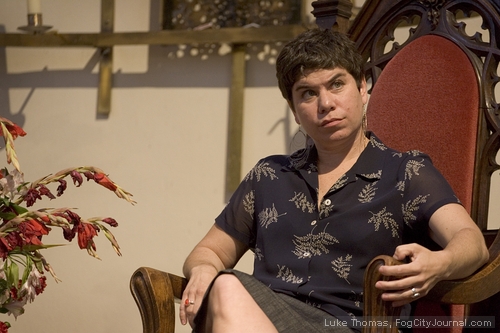
Antonia Juhasz
In her fight against Chevron, Juhasz noted that the oil lobby has increased its presence and influence since the start of the Obama administration. She argued Chevron is “driving the war” via its interests in Iraqi oil and the “Afghan energy corridor” due to its oil production in Kazakhstan. Chomsky echoed her sentiments by calling for a debate on Afghan policy, and pointed out that the one voice missing from the discussion was that of the Afghan people.
“What they think amounts to zero,” Chomsky said.
Latin America
Chomsky argued the primary threat to US interests in Latin America had been identified as “popular nationalistic regimes that seek to improve the poor living conditions and fulfill the needs of the people.” Any attempts to repatriate resources by these nations are strictly against US interests resulting in sustained political meddling and conflict.
In the 1940s, it was decided that Latin America must be prevented from “excessive industrialization” to eliminate a threat to US interests. Thus the US is largely responsible for stunting the economic growth of many developing nations in order to promote US industry and commerce.
David Bacon, a journalist and documentarian, added more fuel to the fire in his speech about Colombia and US-Latin American trade policies, highlighting the fact that over 3800 trade unionists have been killed in Colombia since 1986. The money saved in cutting back in social services, he said, is handed over to foreign banks in order to make Colombia more attractive to foreign investment.
Bacon then questioned the proposed free trade agreement with Colombia. The biggest product of these policies is mass displacement: people looking for work and survival through migration which, he said, explains why displaced migrants are seeking employment in the US.
“Trade agreements don’t solve immigration problems, they create them,” Bacon said. “Immigration policy regulates it. We are illegalizing the workforce we depend upon.” He argues that these policies were about creating inequality and therefore profits for companies who pay lower wages.
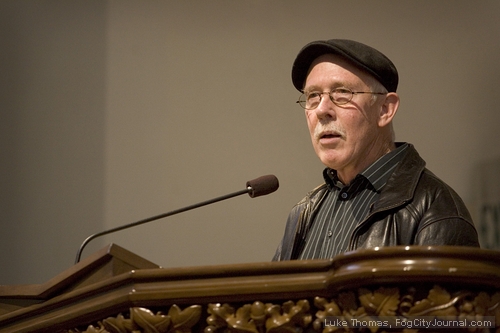
David Bacon
In spite of suggestions by Adam Smith, the father of modern economics, and many other top economists, the US refuses to allow smaller economies grow out of its shadow and, therefore, helped to widen the division between the First World and the Third World in the 20th Century after China and India had dominated in the 19th century.
Mexico
Fearing a “cloud of democracy” in Mexico, which might not be favorable to the US, the Mexico Treaty of 1848 tied the hands of the presiding and future Mexican governments. The treaty was dictated by the US and was weighted heavily in its favor. In 1994, President Clinton began to militarize the US-Mexican border with Operation Gatekeeper, which in turn began to destroy the Mexican economy and agriculture: they just couldn’t compete with their highly-subsidized US counterparts.
The reasoning behind this was, argues Chomsky, “If we can’t control Latin America, how are we going to control the rest of the world?” The US, he says, has long-operated on “The Mafia Principle” in which “the Godfather does not tolerate disobedience. Any outbreak of democracy would be a bad example and a potential virus that might spread, threatening US control.”
At this point, one quarter of Mexico’s income is derived from oil, one quarter from remittances, and one quarter is generated by narcotics trafficking (which is protected by the military). To talk or write about this in Mexico is to sign your own death warrant. The drug war in Mexico is, says Chomsky, avoiding the main participants: the government and the corporations.
Cuba
Cuba is an anomaly, a constant thorn in the side of US foreign policy. A country that has successfully defied the US for decades, it is considered too dangerous. After all, Fidel Castro’s idea of taking matters into your own hands and working for other people could appeal to other nations, and that cannot be tolerated. Hence, the US spends vast sums of money trying to track and block Cuban trade and commerce all over the globe. Chomsky cited Iran as another example of “successful defiance” since the Iranian revolution in 1979.
Domestic Slavery
Turning his attention on domestic policy, Chomsky summed up in brief: “The insurers have won the healthcare battle, they’ve got everything they wanted… big banks that caused the crisis are better off than before. They have been merged into still bigger banks, which means they get the huge government insurance policy, which is called ‘Too Big to Fail’…it makes sense to take risks because you can make a lot of money out of it and you still get paid off if things go wrong, which they truly will.”
He also criticized the way the US has criminalized the underclass at home: ‘Slavery has not been eliminated in the United States…criminalizing Black life, life for the poor,” partly via the pretext of criminalizing drug use. “Once you’re caught in the criminal system, you can’t get out because of the costs involved,” arguing that there had only been “20 or 30 years of some kind of freedom for Blacks since the first African was brought to the US as a slave.”
Steve Williams, co-director of People Organized to Win Employment Rights (POWER, www.peopleorganized.org), then spoke about the growing issues surrounding domestic unemployment.
“The ruling elite’s response in the United States to crises is war, and not just abroad,” he said.
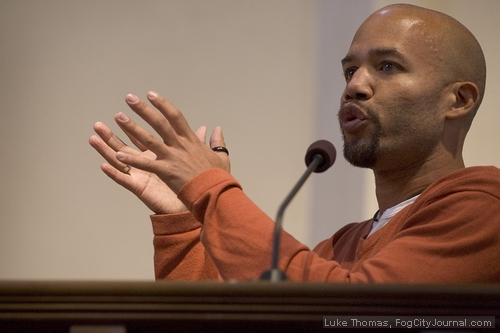
Steve Williams
Revealing figures as high as 30 million people without employment, and 45 million without medical insurance, he called US domestic policy an attack on low-income people that amounted to “stealing money.” Illegal immigrants must now, for example pay a fine of $5000 and wait a week to get their car back, if the police confiscate it.
Williams also informed the audience that Mayor Gavin Newsom recently sold the Bayview/Hunter’s Point Shipyard to Lennar, a Miami-based property development company, for $1. Instead of cleaning up the toxic waste dumped there, Lennar is merely going to cover the toxics with concrete before developing the area.
“Are we emerging from a crisis of Capitalism, or from Capitalism in crisis?” he asked.
Despite the rather bleak view painted of aggressive US corporate imperialism, both abroad and at home, Chomsky finished with the encouraging words that the gap between public opinion and public policy (or Democratic Deficit) was “not a law of Nature and has been overcome in the past by militant, organized, dedicated action – and it can be again.”
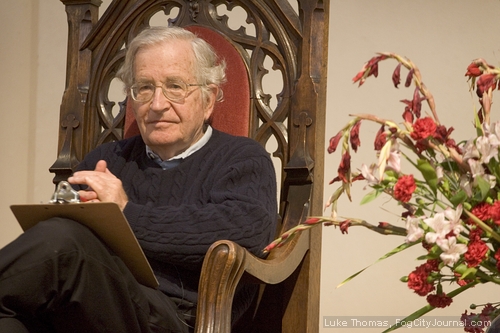
Noam Chomsky


 The Hunger Site
The Hunger Site
December 8, 2013 at 8:36 am
The Clinton Doctrine also included humanitarian war, joining “our values and our interests,” for the good of both the US and the country we attack. “But where our values and our interests are at stake, and where we can make a difference, we must be prepared to do so.” But that’s really nothing new.
What seems new is the creation of the whole genocide industrial complex, allied with the Holocaust industrial complex to justify making war in the name of stopping mass atrocities and genocide – especially in countries on Israel’s hit list, like Libya, Syria, Sudan, and Iran.
October 12, 2009 at 3:33 pm
As I was following Chomsky’s and other eminent speakers’ address in San Francisco on 8th October, delivered to me by a friend, I want to share a few thoughts with your readers.
I am a first time visitor/traveler in the US. I have found an appalling ignorance amongst citizens of the US about India and sidelining by the media. Just now we are worried about the US possibly planning to get out of Afghanistan and perhaps nuclear powered Pakistan without eradicating Taliban and the terrorists. It is the US that encouraged the Taliban to grow and used them against the former Soviet Union. There was a time when Osama Bin Laden was in the US’ good books, just as Saddam Hussein once was. Pakistan was helped to develop nuclear power by Reagan.
But today, India, without a reliable stock of its own nuclear weapons, is left to fend for itself against a Talibanised Afghanistn and fundamentalist Pakistan, both of which enjoy the support of China and the US.
We have been rewarded indeed for practicing democracy. Pakistan would have cracked into five States long back but if not for the staunch support for the Pakistani military by the west. Just the Punjabi elite of Pakistan is ruling with an iron hand and suppressing all other regions in Pakistan.
Let me tell you the North West Frontier produced a Gandhi like figure called Khan Abdul Gaffar Khan who had successfully trained his people into a nonviolent army during India’s freedom struggle, and they voted to stay with India. But the partitionist British did not allow it. They were by no means unruly mobs they are being portrayed as today. Pakistan cannot keep them with force. British liked the dust after many Afghan wars. The Duran line running to cut the Pushto people, like the Indo-Tibetan border, is arbitrary.
I am prepared to present a full case if anybody wishes to know more.
Sincerely yours,
Phaluguna, Bangalore, India, on Tour, now in Santa Clara, CA
October 9, 2009 at 3:42 pm
Oh, yes, the anti-Americans enjoy getting together to dis their country, allegedly the source of all evil in the world. But who exactly was it that recently killed all the Aghan and Pakistani civilians with car bombs? The noble “resistance” to US imperialism, the homicidal/suicidal crackpots that want to impose their fanatical nonsense on those people. Polls show that the Afgan people don’t want the Taliban to take over their country, and even the Pakistanis are beginning to understand who their real ememies are.
http://district5diary.blogspot.com/2009/10/code-pink-reality-check-in-afghanistan.html
October 8, 2009 at 6:02 pm
And I was wrong — Noam Chomsky did indeed mean the Clinton Doctrine. From his book “Hegemony and Survival”:
… Putin and Ivanov cited the Bush doctrine of “preemptive strike”– the “revolutionary” new doctrine of the National Security Strategy — but also “added a key detail, saying that military force can be used if there is an attempt to limit Russia’s access to regions that are essential to its survival,” thus adapting for Russia the Clinton doctrine that the US is entitled to resort to “unilateral use of military power” to ensure “uninhibited access to key markets, energy supplies, and strategic resources.”
October 8, 2009 at 4:43 pm
Hi All. Thanks for this great article (and great photos!).
I’d like to just offer two corrections to the great synopsis of my talk:
1) “that Wednesday marked the ninth year since the US invasion Afghanistan.”
correction:
I said that Wednesday marked the first day of ninth year of the U.S. invasion of Afghanistan.
(it’s the eighth year since the invasion began)
2) “She argued Chevron is “driving the war†via its interests in Afghan oil and, indeed, Kazakhstan.”
Correction:
I said that Chevron is “driving the war” via its interests in Iraq oil, and the “Afghan energy corridor” due to its oil production in Kazakhstan.
Afghanistan has some oil, but very little.
Thank you.
best,
Antonia Juhasz
October 8, 2009 at 3:01 pm
I don’t think Chomsky would be immune from telling someone to “kiss my ass” if he had to deal with Brown, Newsom and their posse every day.
November 28, 2013 at 4:47 pm
I don’t get what you mean the posse. Could you elaborate?
October 8, 2009 at 1:13 pm
Thanks for the article about Noam Chomsky.
It’s heartening to be reminded that there are still progressives left who value intelligence and who can present an argument that is logical, articulate, and inspiring.
We don’t see many of these in SF anymore. Too often what we get is a red-faced politician shouting obscenities, such as:
“Kiss my gay ass!” (Tom Ammiano).
Or, more generically:
“Kiss my ass!” (Chris Daly, Jake McGoldrick).
Or just expressing cheesiness:
“Payback is a bitch” (Aaron Peskin).
Let’s all reflect on Chomsky’s good example.
October 8, 2009 at 1:00 pm
Chomsky may have said “Clinton Doctrine”:
In spite of the many evils committed under the two Bush regimes, Chomsky warned that it was the Clinton Doctrine, claiming the US has the right to use extreme force to preserve its global interests, was the most sinister.
but I’m almost certain he meant Carter Doctine:
http://en.wikipedia.org/wiki/Carter_Doctrine
“The Carter Doctrine was a policy proclaimed by President of the United States Jimmy Carter in his State of the Union Address on January 23 1980, which stated that the United States would use military force if necessary to defend its national interests in the Persian Gulf region.”